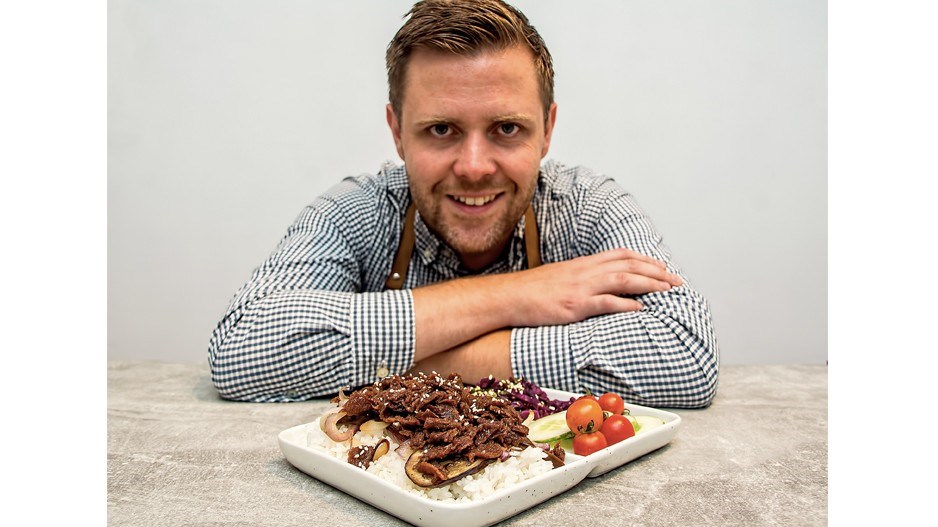Launching a new product during the COVID-19 pandemic may seem counter-intuitive.
But despite its apparent unconventionality as a marketing strategy, it can also pay off in spades, as Blair Bullus found out.
Bullus, president of Vancouver-based Top Tier Foods Inc., specializes in vegan meat-replacement food products that can be found at local restaurants and markets. The company, which made waves in the local food services sectors years ago when it launched its line of quinoa as a replacement for rice in sushi, had been working on its latest offering, called Waygu, for more than a year when the pandemic closed down everything in March.
“COVID put a pause on everything,” Bullus said. “Prior to COVID, I was travelling all over the place to bring clients samples of Waygu. The hype was good, and we were all ready for launch. I was actually in L.A. getting ready to fly to Japan when everything shut down. So I had to cancel events in Singapore, New York and Montreal and come home.”
The shutdowns included restaurants, a major client base for Top Tier, and Bullus admitted business was not easy during the height of the economic lockdown.
However, when business activity started coming back online slowing in the summer, Bullus decided that 2020 would remain as good a time as any to unveil Waygu – a soy-protein-based alternative to high-grade Japanese Wagyu beef – to the world.
“One of the benefits for us is that we are launching a product when no one else is launching products,” he said. “We have some additional exposure time, because we are in a vacuum of space in terms of people promoting products. And we’ve been able to get good attention, and what we’ve seen as a result is just an extreme amount of interest in the product.”
Within days of officially unveiling Waygu, Bullus began receiving calls not only from the North American market where Top Tier primarily operates, but also from places like the Philippines, Dubai and Europe. The Vancouver executive said he has now scheduled a number of calls with interested parties in the European market for later this month, and a number of North American chains have shown a willingness to take a closer look at offering Waygu at their restaurants.
“There is global demand,” Bullus said. “It’s not just North America or Japan, where they are familiar with soy-based meat alternatives. It’s coming from everywhere from Europe to Australia, and that to us is very promising, because it shows the product is hitting a nerve with people around the world.”
COVID did change some of Bullus’ usual business strategy. Since restaurants are just now slowly returning to a semblance of normalcy, food products have seen growth in direct-to-consumer channels like supermarkets, as people stay home more to prepare their ow meals. Bullus said while Top Tier isn’t planning on selling Waygu directly to consumers yet, the company is looking at connecting with manufacturers of frozen pre-made meals to meet direct-to-consumer demand by including Waygu in those products.
But since Top Tier has been so inseparably integrated into the local and regional restaurants industry, Bullus added he wants the success of Waygu – which carries the full texture and flavours of real beef without carrying any meat or esoteric chemical ingredients – to provide a potential boost to the sector that has supported his company for so many years.
“We will begin to start servicing smaller restaurants [with Waygu] right away, because those restaurants don’t have long lead times to get new products out there,” Bullus said. “We have worked with small chains in California and New York, as well as a number of mom-and-pop shops all over the place, and they will likely be the first places to have Waygu first.... We know the industry is struggling, and you need something to draw people to your restaurants. So Waygu, in a way, is unique in that it can showcase the restaurants where it is available.”
The meat-replacement sector has boomed in recent years prior to COVID-19, as a combination of perceived health benefits, awareness of meat production’s impact on the environment and willingness on the part of consumers to try new ingredients drove the industry to new highs. An Allied Market Research report pegged the global meat substitute market at US$4.1 billion in 2017 and projected that total to almost double to US$8.1 billion by 2026.
Data also shows there remains much market potential in meat replacements if they can start taking a bigger slice of the overall meat-products market globally. According to a July CB Insights report, about 30% of all calories consumed by humans currently are from meat products, and the overall meat market may be worth as much as US$2.7 trillion by 2040.
The report did confirm, however, that COVID-19 may have dealt heavy damage to the meat-industry supply chain across the globe, resulting in US$20 billion in losses this year.




